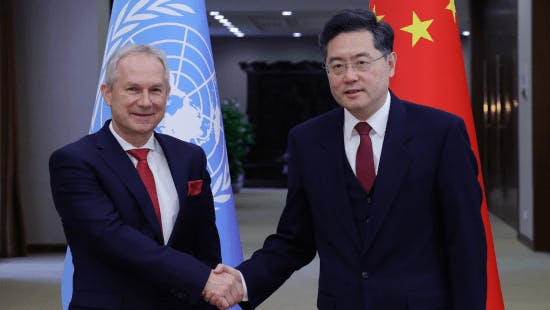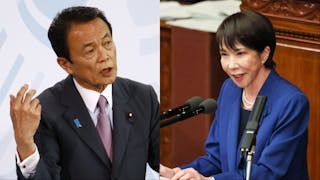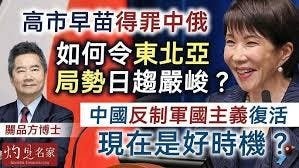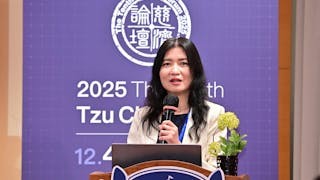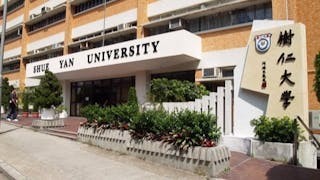秦剛於2022年12月20日被任命為中華人民共和國外交部長後,一直在進行一種新型的中國電話外交。
2023年1月9日,秦剛同俄羅斯外長拉夫羅夫、巴基斯坦外長扎爾達里、韓國外長朴振通電話。秦剛對拉夫羅夫表示,中俄全面戰略協作夥伴關係深入推進,雙方在不結盟、不對抗、不針對第三方的基礎上建立關係。
秦剛強調不結盟、不對抗、不針對
秦隨後告訴扎爾達里,中巴兩國有着特殊的關係,高層互信互動。以此加深傳統友誼,打造更加緊密的中巴命運共同體。
秦剛對扑振說,中韓是近鄰,兩國關係健穩定發展符合雙方共同利益。秦剛對南韓政府對中國遊客採取的臨時限制措施表示關切,他希望韓方對中國應對新冠疫情秉持更加客觀、科學的態度。
2023年1月17日,秦剛與馬來西亞外長贊比里通電話,表示2024年是兩國建交50周年。秦剛表示,中方願意推進共建「一帶一路」合作,共同維護亞太地區和平穩定。秦剛又說,馬來西亞政府對中國防疫政策持客觀公正看法,中方對此表示讚賞。相信在雙方共同努力下,兩國人員往來將很快恢復正常。對此,贊比里表示,馬方高度重視高度重視對華關係,願同中方加強高層交往和人文交流,深入挖掘共建一帶一路合作潛力,推動馬中關係發展。
1月20日,秦剛同印尼外長蕾特諾通電話。秦剛表示,中方願同印尼方密切合作,推動中國印尼命運共同體不斷走深走實。他又說,中方全力支持印尼東盟輪值主席國的工作。
此外,中方將鼓勵更多優質中國企業赴印尼投資興業。蕾特諾表示,印尼期待兩國關係進一步鞏固,印尼高度重視並將全力保障中方項目和人員安全,歡迎中國遊客盡早到印尼旅遊。
閃電戰式的電話外交
1月30日,秦剛採取閃電戰式的電話外交,與荷蘭首相兼外相胡克斯特拉、沙特阿拉伯外相費薩爾、阿根廷外長卡菲耶羅通了電話。秦剛在與胡克斯特拉通電話時表示,中方期待落實好兩國領導人重要共識,加強各層級交往,使中荷全面合作夥伴關系不斷取得新進展。此外,中國在氣候變化、共同維護共同開放而非分裂、有序而非混亂的國際貿易環境等領域支持荷蘭。雙方都談到了日本將核污染廢水排入海洋的決定,認為此舉會影響人類健康和海洋環境。
就在秦剛與胡克斯特拉通電話時,有消息稱荷蘭與美日合作,限制向中國出口晶片。對此,秦剛在與胡克斯特拉通話時表示,國際貿易環境應該保持國際物流供應鏈的穩定和開放,而不是維持其「分裂和混亂」的環境。
中沙對話 冀盡早建成自由貿易區
秦剛在與費薩爾的談話中,強調習近平主席不久前出席首屆中國—阿拉伯國家峰會、中國—海灣阿拉伯國家合作委員會峰會並對沙特進行的國事訪問。秦剛表示,中方願同沙方一道落實好峰會成果,推動中沙、中海、中阿關系邁上新台階。秦剛特別強調,中國堅持維護國際關係基本準則,特別是不干涉內政等原則。
在與費薩爾的對話中,秦提到了盡早建成中國─海灣自由貿易區,以及擴大雙方在經貿、能源、基建、投資、金融、高科技及半導體產業物流供應鏈等領域的合作,顯然,中國非常渴望深化與海灣國家在經貿、能源、基建、投資、金融及半導體產業的合作──此舉符合中國的一帶一路倡議及在世界上贏得更先進和發達國家人心的渴望。
由於許多海灣國家資源豐富,經濟發展也相當發達,中國—海灣自貿區的構想值得關注。如果要發展這樣一個自由貿易區,人民幣自然可望中國與海灣經貿關係中,廣泛使用的國際交易貨幣。
中方支持阿根廷 發揮更大作用
在與卡菲耶羅通電話時,秦剛表示,中國和阿根廷是好朋友、好夥伴,中方願同阿方一道,落實好兩國元首重要共識,傳承發揚中阿相互尊重、平等相待、合作共贏的優良傳統,推動中阿全面戰略夥伴關係取得更大發展。
為爭取阿方支持,秦剛表示,中方支持阿根廷在國際和地區事務中發揮更大作用。
中方支持阿富汗 實施溫和穩健政策
1月21日,秦剛和阿富汗臨時政府代理外長穆塔基通電話時表示,中方希望阿方採取強有力措施,確保在阿中方人員和機構安全。對此,穆塔基應說,阿富汗絕不允許任何勢力利用阿領土從事破壞阿中友好和損害中方利益的活動,堅決打擊各種形式的恐怖主義,將採取有力措施,確保中國在阿人員和機構安全。2022年12月,阿富汗一間中資酒店遇襲,造成3人死亡、18人受傷。
秦剛又說,中方支持阿富汗臨時政府構建廣泛包容的政治架構,實施溫和穩健的內外政策。中方同情阿富汗人民遭受的苦難,願為阿富汗經濟社會發展和民生改善提供更多幫助。
土耳其:高度重視對華關係
2023年2月2日,秦剛致電土耳其外長恰武什奧盧,表示希望土方重視中方在涉新疆等問題上的關切。恰武什奧盧重申,土方將一如既往奉行「一個中國」原則,不會借中國內部事務對中國進行抹黑攻擊。秦剛表示,中方讚賞土方多次表示堅定奉行一個中國政策,而中方亦支持土方維護其國家主權和安全,反對外部勢力干涉土內政。秦剛又表示,希望中土雙方加強在聯合國等國際組織中的溝通與協調,共同維護發展中國家的利益。
恰武什奧盧表示,土耳其高度重視對華關係,雙方將深化經貿合作和國際協調。他重申,土耳其將一如既往奉行一個中國政策,不會攻擊或抹黑中國內部事務。
與日對話 籲慎重對待兩國問題
2023年2月2日,秦剛與日本外相林芳正通電話,這是秦剛就任中國外長以來兩人的首次對話。秦剛表示,和平共處、友好合作是中日兩國唯一的正確選擇,也契合新時代中日關係發展的方向。2023年是中日和平友好條約締結45周年,中方願與日方以此為契機,堅持「互為合作夥伴、互不構成威脅」的政治共識,深化合作。秦剛表示,希望日方秉持客觀理性的對華認知,慎重對待歷史和台灣問題。
對此,林芳正表示,日方願加強各層級對話溝通和國民交流,推進務實合作。他其後透露,他獲秦剛邀請訪問中國。不過,林芳正也承認,日中兩國都面臨很多挑戰,包括東海、南海、香港、新疆和台灣等問題。
在日本不僅與美國而且與印度建立更密切軍事關係的情況下,日本與美國在意識形態上親近,自然會將中國視為真正的軍事和經濟威脅;日本與台灣的密切關係也讓東京對海峽兩岸關係的變化感到擔憂。
儘管如此,正如林芳正所承認的那樣,雙方都同意建設性和穩定的日中關係是日中領導人的共識。
日本增加軍備和防衛能力不僅是對「中國威脅」認知的回應,也是對北韓軍事建設和核能力的回應。林芳正表達了日方對北韓綁架日本人的關切,秦剛則表示中方將在此事上與日方進行合作因應。
在電話對話中,林芳正表示「強烈」要求中國在「尖閣諸島」(中方稱釣魚島)問題上採取「負責任的行動」。
儘管存在意見分歧,但日中兩國將注意力集中在氣候變化、綠色經濟、公共衛生、青年交流和兩國人員交流等低層次政治問題上是明智的。
2023年2月2日,秦剛在北京會見了第77屆聯合國大會主席克勒希。秦剛表示,聯合國要講公道話、辦公道事,維護和平安全,捍衛公平正義,堅持多邊主義,摒棄意識形態對抗,促進文明互鑑,在全球治理中發揮關鍵作用。他又說,中國將繼續支持聯大和聯大主席的工作。
強調共同利益 不干涉內政
總的來說,中國外交部長秦剛採取了密集的電話外交,致電俄羅斯、巴基斯坦、南韓國、馬來西亞、印尼、荷蘭、沙特阿拉伯、阿根廷、阿富汗、土耳其和日本的外相和外長。他與所有這些國家的外交對話的共同特點,首先是重申中國與有關國家的共同利益;其次是提及中華人民共和國在各國的利益和保護;第三,重申中國不干涉主義、多邊主義、合作共贏的原則,以及維護地區和世界和平的共同價值觀;第四,在倡議的框架下,促進中國投資和商業擴張,深化雙邊社會經濟和技術關係;最後,尋求中國和有關國家認為是問題的解決辦法。顯然,新任中國外交部長採取密集而果斷的電話外交,以實現中國外交政策的目標,即鞏固與現有朋友的牢固關係,贏得更多世界朋友的人心,維護地區和世界和平。通過深化經濟和可持續發展領域的合作,堅持「一個中國」原則和促進中華人民共和國在世界各國的經濟和安全利益,實現「人類命運共同體」的願景。
Qin Gang’s Telephone Diplomacy and its Features
After Qin Gang was named as the Foreign Minister of the People’s Republic of China (PRC) on December 20, 2022, he has been conducting a new kind of Chinese telephone diplomacy.
On January 9, 2023, Qin Gang had phone calls with Russian Foreign Minister Sergei Lavrov, Pakistani Foreign Minister Bilawal Bhutto Zardari, and South Korean Foreign Minister Park Jin. Qin told Sergei Lavrov that the China-Russia comprehensive strategic partnership had been deepened and both sides had built up their relations on the principles of non-alignment, non-confrontation, and non-direction toward any third party.
Qin then told Bilawal Bhutto Zardari that both China and Pakistan enjoy special relationships with high-level mutual trusts and interactions. As such, both sides would deepen their traditional friendship and forge a closer China-Pakistan community with a shared future.
Qin told Park Jin that China and South Korea are close neighbours with sound mutual relationships. Qin expressed his concern about the temporary restrictions imposed by the South Korean government on mainland Chinese visitors, and he hoped that South Korea would adopt a more objective and scientific attitude toward how China tackled COVID-19 and its variants.
On January 17, 2023, Qin Gang held a phone discussion with Malaysian Foreign Minister Zambry Abdul Kadir, saying that the year 2023 represents the 50th anniversary of the diplomatic relations between the two countries. Qin said that China is eager to promote bilateral relations in its Belt and Road initiative and maintain peace in the Asia-Pacific region. Qin added that the Malaysian government adopted a fair attitude toward how China tackled COVID-19 and its variants, and that the personnel of both sides should resume interactions soon. In response, Zambry said Malaysia attached great importance to its traditionally close relations with China and the promotion of bilateral ties through the Chinese Belt and Road initiative.
On January 20, Qin held a phone conversation with the Indonesian Foreign Minister Retno Marsudi. Qin said China is ready to work closely with Indonesia to build up a stronger China-Indonesia community with a shared future. He added that China fully supports Indonesia becoming the rotating president of ASEAN.
In addition, PRC enterprises would invest more and do business in Indonesia. Marsudi said that Indonesia looks forward to the consolidation of bilateral relations and that his country attaches great importance to the security of Chinese investment projects and to the visits of more Chinese tourists.
On January 30, Qin adopted blitzkrieg-style telephone diplomacy by having phone conversations with the Dutch Prime Minister and Foreign Minister Wopke Hoekstra, Saudi Arabian Foreign Minister Prince Faisal bin Farhan Al Saud, and Argentinian Foreign Minister Santiago Cafiero. In his phone talk with Hoekstra, Qin said that China looked forward to implementing the consensus reached by China and Holland, consolidating exchanges at all levels, and pushing for progress in the Sino-Netherlands comprehensive cooperative partnership. Moreover, China backs up the Netherlands in the areas of climate change, the maintenance of an open and orderly international trade environment rather than a fragmented one. Both foreign ministers talked about Japan’s decision to discharge nuclear-contaminated water into the ocean – a move that they saw as affecting human health and the marine environment.
At a time when Qin had the phone dialogue with Hoekstra, it was reported that Holland cooperated with the US and Japan to restrict the export of chips to the PRC. In response, Qin Gang in his phone dialogue with Hoekstra said that the international trade environment should maintain the stability and openness of the international logistics supply chain rather than retaining its “fragmented and chaotic” nature.
Qin’s discussion with Faisal included the former’s emphasis on President Xi Jinping’s recent visit and attendance at the first Sino-Arab States Summit and the China-Gulf Cooperation Council Summit. Qin said that China is eager to work with Saudi Arabi and bring their relations to a new height while strengthening relations through the China-Gulf Cooperation Council. In particular, China upholds the basic norms governing international relations, especially the principle of non-interference with international affairs.
In the Qin-Faisal dialogue, Qin mentioned the early construction of the China-Gulf Free Trade Zone and the mutual cooperation in energy, infrastructure projects, monetary and financial development, high tech projects and the logistics supply chain of the semi-conductor industry. Obviously, China is very eager to deepen trade, energy, infrastructure, and semi-conductor cooperation with the Gulf states—a move in conformity with the PRC’s Belt and Road initiatives and its eagerness to win the hearts and minds of more advanced and developed countries in the world.
As many Gulf states are rich in their resources and quite developed in their economic development, the idea of the China-Gulf Free Trade Zone deserves our attention. Naturally, if such a free trade zone is to develop, the internationalisation and widespread usage of Renminbi as a currency for economic transactions in China-Gulf relations will be anticipated.
During the phone talks with Cafiero, Qin remarked that both China and Argentina are good partners, adding that China is eager to work with Argentina to implement the consensus reached by the heads of state of both countries. Furthermore, both sides would carry out the tradition of having mutual respect, treating each other as equals, and achieving win-win cooperation while promoting the development of the Sino-Argentinian comprehensive strategic partnership.
To win the support of the Argentinian side, Qin Gang said that China supports Argentina’s bigger role in regional and international affairs.
On January 21, Qin had a phone discussion with the Afghanistan Foreign Minister Amir Khan Muttaqi, saying that China hopes the Afghanistan side would adopt stronger measures to protect the safety of Chinese personnel and projects in Afghanistan. In response, Amir Khan Muttaqi replied that Afghanistan would not tolerate any force to undermine the Chinese interests in Afghanistan and their friendly relations. Moreover, Afghanistan would resolutely fight against terrorism and protect the safety of the Chinese personnel and projects. In December 2022, a Chinese-invested hotel was attacked in Afghanistan, leading to three deaths and eighteen injuries.
While Qin added that China supports a more tolerant political structure in Afghanistan and a more moderate and stable internal and external policy, China is sympathetic to Afghanistan’s sufferings and supportive of the country’s social and economic development through developmental aid.
On February 2, 2023, Qin Gang called Mevlut Cavusoglu, the Foreign Minister of Turkey, expressing his hope that Turkey could and would attach importance to China’s concern about Xinjiang’s development. Mevlut Cavusoglu said that Turkey would adopt the one-China principle and that it would not blacken the image of China in dealing with the PRC’s internal affairs. Qin remarked that China appreciates Turley’s one-China policy and that it supports Turkey’s quest for its own path of development, the protection of its territorial integrity, sovereignty, and safety, as well as its pursuit of opposing external interference. Qin expressed his hope that China and Turkey would strengthen communication and coordination in the United Nations and other international organisations for the sake of protecting the interests of developing countries.
Mevlut Cavusoglu said that Turkey attaches great importance to its relations with China, and that both sides would deepen trade cooperation and international coordination. Moreover, Turkey would pursue its one-China policy and would not attack or blacken the image of China’s domestic affairs.
On February 2, 2023, Qin Gang had a phone discussion with the Japanese Foreign Minister, Hayashi Yoshimasa – the first dialogue between the two since Qin became the Chinese Foreign Minister. Qin remarked that peaceful coexistence and friendly cooperation are the correct choices of China and Japan and that these choices are the directions for Sino-Japanese relations in a new era. After all, 2023 represents the 45th anniversary of the Sino-Japanese peace and friendly agreement. As such, China grasps this opportunity to persist in the pursuit of mutual cooperative partners and mutually non-threatening nature, thereby reaching political consensus and deepening collaboration. Qin said that China hopes Japan can adopt an “objective” stance to deal with history and the question of Taiwan in a promising and circumspect manner.
In response, Hayashi Yoshimasa said that Japan would like to strengthen mutual communications and the interactions between the citizens of the two countries. He revealed later that he was invited by Qin Gang to visit China. However, Hayashi admitted that both Japan and China encounter many challenges, including the questions of the East Sea, South China Sea, Hong Kong, Xinjiang and Taiwan.
Under the circumstances in which Japan has forged a closer military relationship with not only the US but also India, Japan’s ideological affinity with the US naturally sees China as a real military and economic threat. Japan’s close relation with Taiwan has also made Tokyo worried about the evolution of Beijing-Taipei relations.
Still, both sides, as admitted by Hayashi, agreed that a constructive and safe relationship is the consensus of the leadership between Japan and China.
Japan’s increase in its military armament and capacity has become a response to not only the perception of the “China threat” but also the military build-up and nuclear capability of North Korea. Hayashi expressed Japan’s concern about the abduction of Japanese by North Korea, while Qing Gang agreed that China would cooperate with Japan on this matter.
During the telephone dialogue, Hayashi expressed a “strong” view of requesting China to adopt “responsible action” with regard to the Senkaku (Diaoyu Island in Chinese) Island.
Despite their opinion differences, it is wise for Japan and China to focus on issues of low-level politics, such as climate change, green economy, public health, youth exchange and interactions between the citizens of both countries.
On February 2, 2023, Qin Gang actually met the United Nations (UN) General Assembly’s President, Csaba Korosi, in Beijing. Qin said the UN must play a crucial role in global governance by speaking and acting impartially, safeguarding peace and security, standing up for fairness and justice, upholding multilateralism, abandoning ideological confrontation, and promoting mutual learning among civilizations. He added that China would continue to support the UN work.
In conclusion, PRC Foreign Minister Qin Gang has been adopting an intensive telephone diplomacy, calling his counterparts in Russia, Pakistan, South Korea, Malaysia, Indonesia, Holland, Saudi Arabia, Argentina, Afghanistan, Turkey, and Japan. His diplomatic dialogue with all these countries is characterised by a common pattern of firstly restating the common interests of China and the states concerned; secondly, the articulation and protection of the PRC interests in various countries; thirdly, the reiteration of China’s principles of non-interventionism, multilateralism, win-win cooperation, and the shared values of maintaining regional and world peace; fourthly the deepening of bilateral relations socio-economically and technologically under the umbrella of the Belt and Road initiative with the thrust of Chinese investment and business expansion; and finally, the quest for solutions to solve problems perceived by China and the states concerned. Clearly, the new Chinese Foreign Minister has been adopting an intensive and assertive telephone diplomacy that seeks to achieve China’s foreign policy objectives of consolidating strong relations with the existing friends, winning the hearts and minds of more friends in the world, maintaining regional and world peace, promoting the one-China principle and PRC’s economic and safety interests in various countries, and achieving a vision of “common destiny for the mankind” through the deepening of cooperation in the spheres of economic and sustainable development.
原刊於澳門新聞通訊社(MNA)網站,本社獲作者授權轉載。網址:
https://www.macaubusiness.com/opinion-qin-gangs-telephone-diplomacy-and-its-features/



